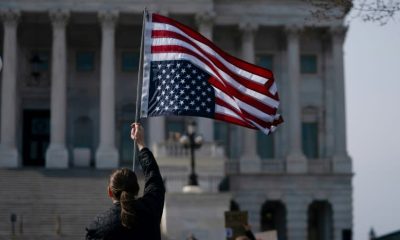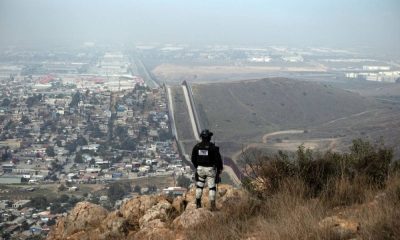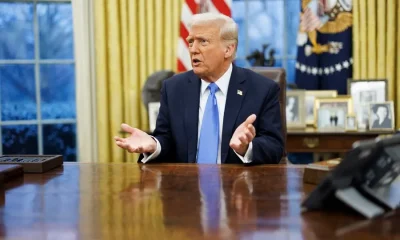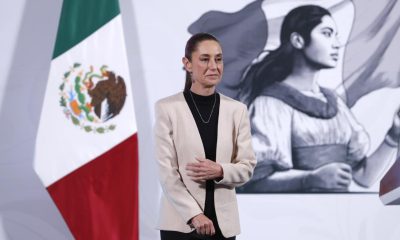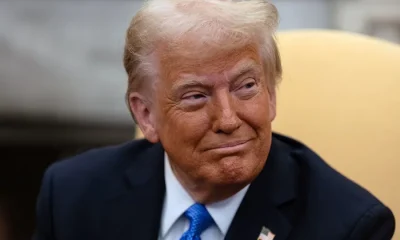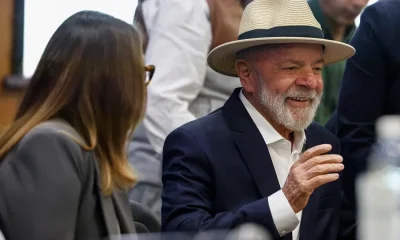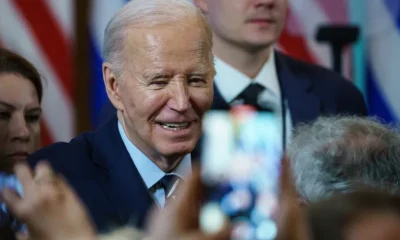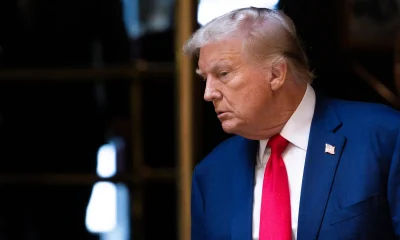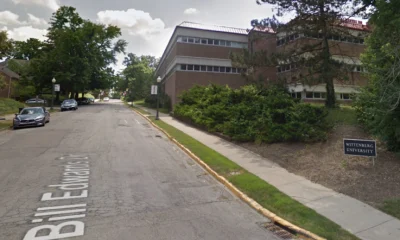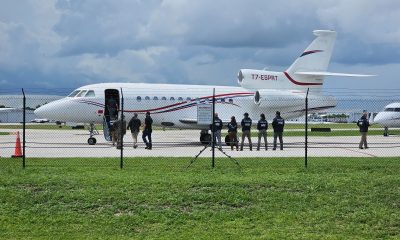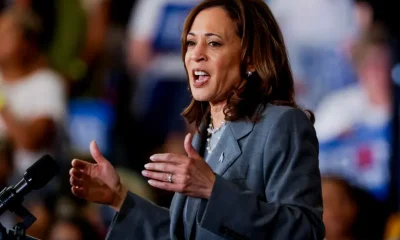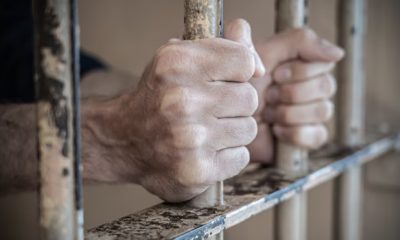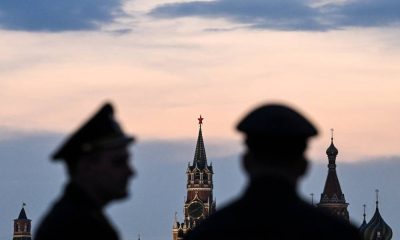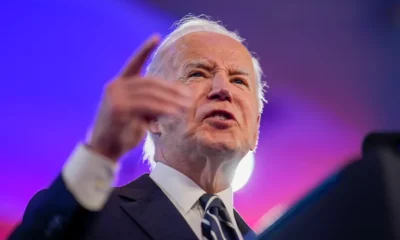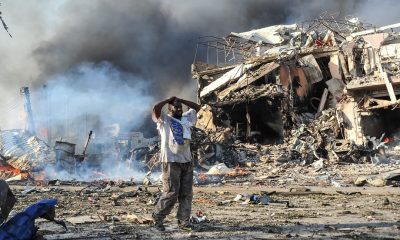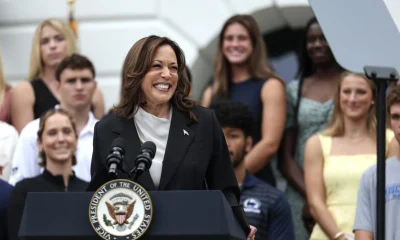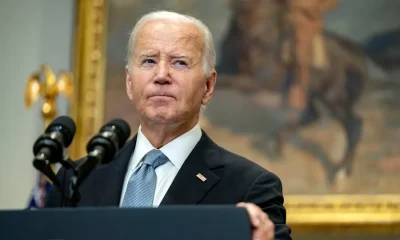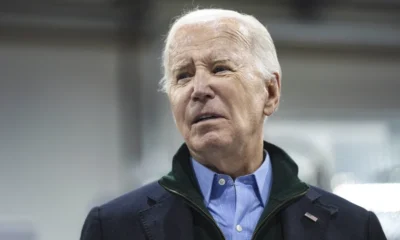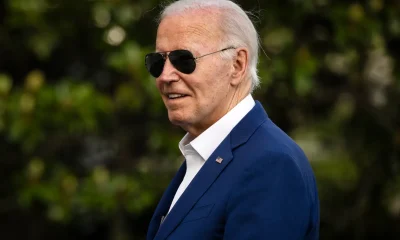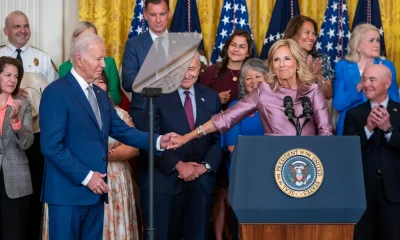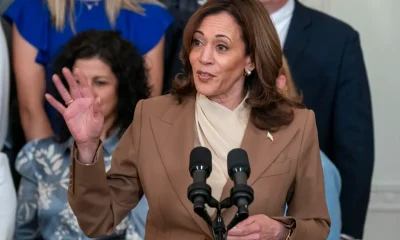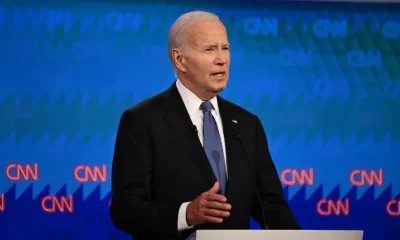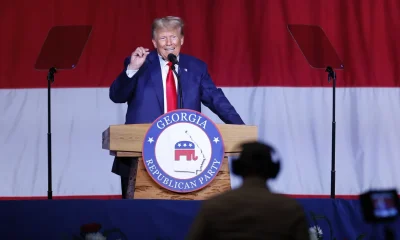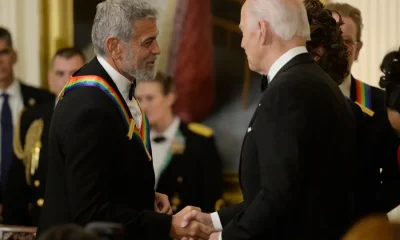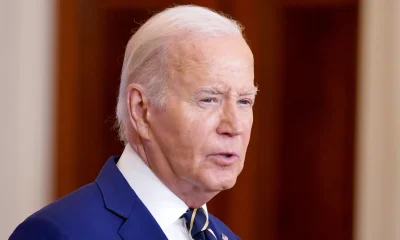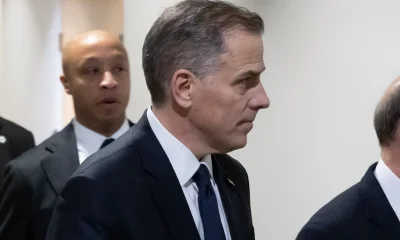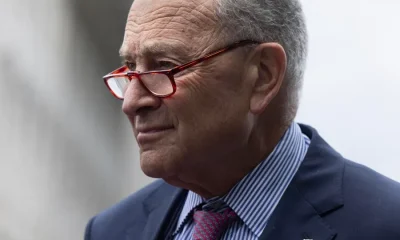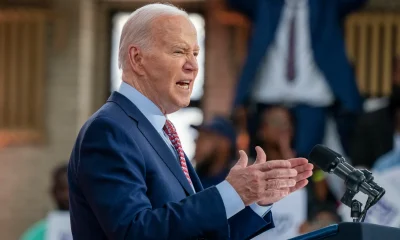International
Biden in Mexico for talks on migrants, drugs
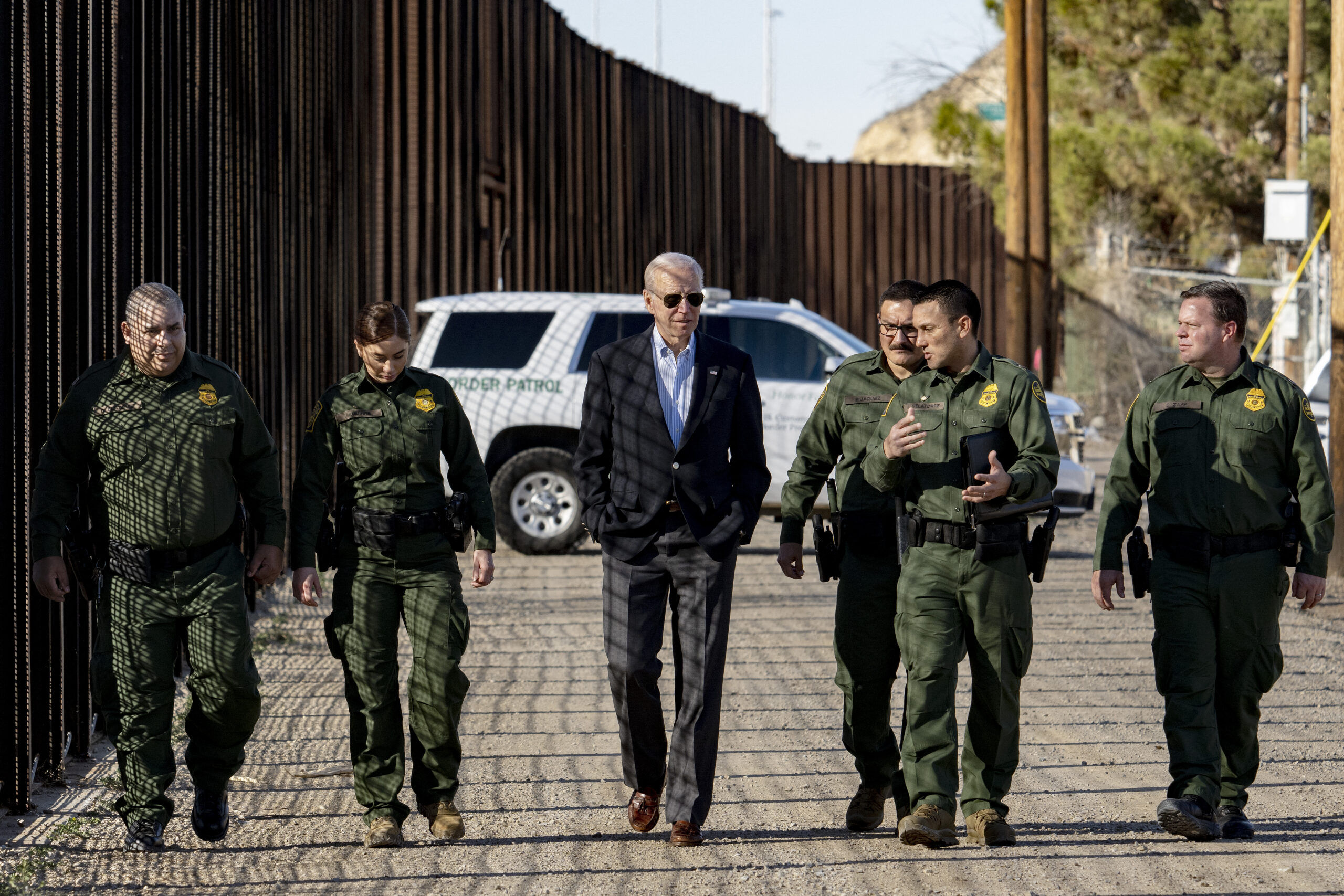
January 9th | By AFP | Daniel Rook |
A regional migration and drug smuggling crisis is expected to dominate talks between US President Joe Biden and his Mexican counterpart Andres Manuel Lopez Obrador on Monday.
Biden arrived in Mexico City late Sunday after a politically charged stop at the southern US border — his first since taking office.
He will meet Monday and Tuesday with Lopez Obrador and Canadian Prime Minister Justin Trudeau one-on-one and also together in what is dubbed the “Three Amigos” summit.
While trade and environmental issues are also on the table, Biden has put a surge in irregular migration and dangerous drug trafficking front and center of his trip, his first to Mexico as president.
“Our problems at the border didn’t arise overnight,” Biden tweeted after his arrival.
“And they won’t be solved overnight. But, we can come together to fix this broken system. We can secure the border and fix the immigration process to be orderly, fair, safe, and humane.”
Lopez Obrador, who joined Biden in his armored limousine for the journey from the airport, called for increased investment in the region so that people are less likely to flee their countries.
“Opportunities must be guaranteed to citizens, to workers of all countries in their places of origin,” he told reporters.
‘Where are our rights?’
On his way to Mexico, Biden stopped for several hours in El Paso, Texas, a city at the heart of the troubled border.
He met with US officials at the Bridge of the Americas crossing, watching a demonstration of the latest border enforcement technology, as well as a customs sniffer dog.
He later got out of his motorcade to inspect a section of the tall fencing that snakes between El Paso and its twin city Juarez on the Mexican side.
“They need a lot of resources. We’re going to get it for them,” Biden told reporters after his visit to the customs post.
Just ahead of Biden’s arrival in Mexico, a line of migrants, some with children in their arms, were deported from El Paso to Ciudad Juarez, according to an AFP reporter at the scene.
Venezuelan Jose David Melendez told AFP that he had been apprehended by border guards at a church where he was taking refuge.
“The police officers from the border patrol came and hit us, made us run, pointed guns at us, pointed at children with firearms. Where are our human rights?” the 25-year-old said.
Biden is under political pressure in the face of spiraling illegal border crossings and applications for asylum.
Adding to the crisis has been a surge in cross-border smuggling of the highly addictive and often deadly narcotic fentanyl.
Biden’s visit sought to respond to Republican accusations that he has been ignoring the situation.
On Thursday Biden announced an expansion of powers to expel people showing up at the border without clearance.
At the same time, a legal, strictly enforced pathway will be created for up to 30,000 migrants a month from Cuba, Haiti, Nicaragua and Venezuela.
The quota will be restricted to those who already have a US sponsor, while anyone attempting to cross the border illegally will be expelled in coordination with Mexico.
Human rights groups harshly criticized this as closing the door on desperate people, but the Biden administration says its actions will essentially kill the market for human smuggling networks, while encouraging legitimate arrivals.
Cartel violence
In 2021, the United States and Mexico announced a revamp of their fight against drug trafficking to address the root causes of migration, encourage economic development and bolster curbs against cross-border arms smuggling.
Mexico is plagued by cartel-related bloodshed that has seen more than 340,000 people murdered since the government deployed the military in the war on drugs in 2006.
Days before Biden’s visit, Mexican security forces captured a son of notorious drug kingpin Joaquin “El Chapo” Guzman, who is serving a life sentence at a US prison.
The United States had offered a reward of up to $5 million for information leading to Ovidio Guzman’s arrest, accusing him of being a key player in the Sinaloa cartel founded by his father.
Climate change and cooperation in clean energy technologies will also be on the summit agenda, with Mexico hoping to benefit from Washington’s efforts to reduce its reliance on Asia-based manufacturers.
International
Claudia Sheinbaum: Operation Against ‘El Mencho’ Was Based on Pending Arrest Warrants

Mexico’s President Claudia Sheinbaum on Wednesday rejected claims that the military operation that resulted in the death of Nemesio Oseguera Cervantes, known as “El Mencho,” leader of the Jalisco New Generation Cartel (CJNG), was carried out under pressure from the United States government.
Sheinbaum explained that the deployment of federal forces was aimed at executing outstanding arrest warrants against Oseguera Cervantes, who was considered one of the most wanted criminals in both Mexico and the United States.
“That was not the objective (to ease pressure from the United States). It is very important, and I want to repeat it. This individual had an arrest warrant, or several,” Sheinbaum said, referring to the operation conducted on February 22.
According to the president, the initial goal was to capture Oseguera Cervantes, but military forces responded after coming under attack during the intervention.
“The operation was to detain him. The problem is that they were attacked — the Secretariat of National Defense — and they responded at that moment,” she said.
The president insisted that the action was not carried out in response to external demands, although she acknowledged intelligence cooperation with the United States.
“It was not done in any way because of pressure from the United States, not at all. Of course, there was intelligence information from the United States that was used specifically,” she concluded.
International
Spain Denies Any Agreement to Cooperate with U.S. Military in Iran Operations
International
White House Says Spain Agrees to Cooperate with U.S. Military After Trump Threatens Trade Embargo

White House Press Secretary Karoline Leavitt said Wednesday that Spain has agreed “in recent hours” to cooperate with the U.S. military, following President Donald Trump’s threat to impose a trade embargo on Madrid.
Trump had warned of potential commercial measures after Spain reportedly refused to allow the Pentagon to use facilities at Spanish military bases for operations related to Iran.
“With respect to Spain, I think you heard the president’s message yesterday loud and clear, and I understand that in recent hours they have agreed to cooperate with the United States military,” Leavitt said during a press briefing.
She added that the U.S. military is currently coordinating with its counterparts in Spain. However, the president expects broader support.
“The president expects that all of Europe, all of our European allies, of course, will cooperate in this important mission — not only for the United States, but also for Europe,” Leavitt said.
Her remarks came in response to questions about Spain’s position and its role as a U.S. ally amid rising tensions surrounding operations involving Iran.
-

 International4 days ago
International4 days agoIran Reports 201 Dead, 747 Injured After U.S. and Israeli Strikes
-

 International3 days ago
International3 days agoBrazil’s Supreme Court Rejects Bolsonaro’s Bid for House Arrest
-

 International3 days ago
International3 days agoAnti-ICE Billboard Campaign Targets Immigration Spending in 31 U.S. Cities
-

 International2 days ago
International2 days agoSpain’s Prime Minister to Address Nation Amid Trump’s Trade Threats
-

 International4 days ago
International4 days agoPope Leo XIV Urges End to ‘Spiral of Violence’ in Middle East
-

 Sin categoría5 days ago
Sin categoría5 days agoTrump: ‘We Think It’s True’ Amid Claims Iran’s Supreme Leader Was Killed
-

 International5 days ago
International5 days agoSecurity Council to Hold Emergency Meeting on Middle East Crisis
-

 International3 days ago
International3 days agoTrump Warns of ‘Major Wave’ of Attacks as Iran Conflict Escalates
-

 International22 hours ago
International22 hours agoWhite House Says Spain Agrees to Cooperate with U.S. Military After Trump Threatens Trade Embargo
-

 International3 days ago
International3 days agoMexico Calls for Immediate Probe After National Dies in ICE Custody
-

 International2 days ago
International2 days agoNew York Announces First 2,000 Seats in Universal 2-K Program
-

 International22 hours ago
International22 hours agoSpain Denies Any Agreement to Cooperate with U.S. Military in Iran Operations
-

 Central America22 hours ago
Central America22 hours agoNicaragua Held Responsible for Harassment of Opposition Prosecutor and His Family
-

 International3 days ago
International3 days agoBolivia Orders Three Investigations Into Deadly Military Plane Crash
-

 International2 days ago
International2 days agoWarner Bros. Developing First ‘Game of Thrones’ Movie With ‘Andor’ Writer
-

 Central America3 days ago
Central America3 days agoPanama Canal Monitoring Trade as Middle East Conflict Disrupts Shipping
-

 Central America2 days ago
Central America2 days agoGuatemala’s Attorney General Fails in Bid for Top Court Seat Amid Corruption Allegations
-

 International22 hours ago
International22 hours agoClaudia Sheinbaum: Operation Against ‘El Mencho’ Was Based on Pending Arrest Warrants





























